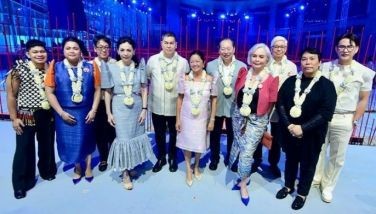US: It's not about containing China
MANILA, Philippines - The United States’ pivot to Asia does not mean containment of China, America’s permanent representative to the Association of Southeast Asian Nations (ASEAN) said yesterday.
“China is an important economic partner for the United States,” US Ambassador to ASEAN David Carden told The STAR. Carden, the first permanent representative of the US to ASEAN, is attending the First Expanded ASEAN Maritime Forum (EAMF) in Manila today.
Asked what “rebalancing” of US interests toward Asia meant, he said there was an inaccurate perception that the new focus on Asia stemmed from the emergence of China as an economic and military power that could rival the United States.
“It’s not a containment strategy,” Carden told The STAR.
He explained that his office is involved in a wide range of interconnected “problems and opportunities” facing the region – issues such as climate change, human trafficking, water and food security, and dealing with pandemics.
Carden reiterated Washington’s position that territorial disputes should be settled peacefully through multilateral channels, through a “rules-based” approach, and “economic coercion” should not be used.
The US, he reiterated, is not taking sides in the territorial disputes in the South China Sea.
Carden assumed his post in Jakarta, Indonesia – seat of the ASEAN Secretariat – on April 26 last year. But he emphasized that the idea to create his office germinated way back in May 2006, long before simmering maritime disputes between the Philippines and China took a turn for the worse.
Among the proponents of the creation of his position was Barack Obama, at the time a senator.
China-Japan row not on EAMF agenda
The territorial row over Senkaku (Diaoyu) Islands that soured relations between China and Japan and spilled over to business ties will not be raised when the two countries join other nations in the EAMF.
But on the eve of the forum, Japanese diplomats criticized China, saying it “tolerated” recent violent anti-Japan demonstrations related to the dispute.
Minister Shinsuke Shimizu, head of political section of the embassy of Japan, said the Japanese delegation to the EAMF will discuss challenges and cooperation issues.
“During the meeting we will only discuss the cooperation issues and Japanese delegation will not raise the territorial issue. Senkaku will not be discussed in the Expanded ASEAN Maritime Forum.”
But Shimizu also said Chinese authorities did not stop violent Japan-related demonstrations in various parts of China following Japan’s announcement of its “purchase” of Senkaku Islands.
This was despite assurances from Beijing that in accordance with the law, China protects the safety of foreign institutions and nationals, he said.
“Chinese authorities tolerate these demonstrations. They did not stop,” Shimizu said.
The Japanese government had protested to China through its Beijing embassy what it saw as inaction by the Chinese authorities.
Japan embassy Head of Chancery Minister Setsuo Ohmori said Japan and its people maintain a peaceful attitude despite Chinese authorities turning a blind eye on the violent protests.
“It is true some Japanese are angry with China for turning a blind eye, but there are no visible signs towards the Chinese,” Ohmori said.
“We never looted, we never vandalized Chinese restaurants in Japan. Japan maintains a peaceful attitude.”
Reports have speculated that the Chinese government had a hand in anti-Japan protests, which spiraled out of control.
Protests flared in cities across China, including the torching and looting of Japanese-invested factories and shops.
“We are looking at the situation in China. No violence against Chinese people in Japan. Most of the Japanese people believe it is not a good thing to make a violent act. It is not a civilized manner,” Ohmori added.
Vienna Convention
Under the Vienna Convention on Diplomatic Relations, host governments have the obligation to protect the safety of foreign embassies and personnel.
They also have the standing obligation to ensure that arrangements are in place to secure the premises of embassies.
“They (China) have an obligation to protect Japan against aggression in their territory,” Ohmori said.
The Japanese government said it is deeply concerned about the wide range of violent acts that have taken place in China.
In contrast to peaceful demonstrations, the ministry said those acts resulted in arson, looting and other damage to the Japanese diplomatic establishments, Japanese restaurants, buildings with Japanese tenants, and the Japanese-owned factories, department stores and supermarkets.
Some Japanese residents have been suffering assault as well as harassment.
“No similar acts have occurred in Japan against Chinese residents or Chinese-owned companies,” the Foreign Ministry said in a statement.
“It seems that those acts are not properly managed in China under the idea of ‘patriotism is not guilty.’ Acts of violence shall not be condoned for whatever reasons. The government of Japan expects that the international community calls for a calm response from the Chinese side,” the Ministry said.
Chinese Foreign Ministry spokesperson Hong Lei said on Sept. 19 that China protects in accordance with law the safety of foreign institutions and nationals in China.
However, Hong said the Japanese government should face squarely the unbreakable will and determination of the Chinese people in safeguarding national territorial sovereignty.
Beijing said the Japanese government’s “purchase” of the Senkaku Islands was illegal, saying it has severely damaged China-Japan relations and exerted negative impact on China-Japan exchanges and cooperation in various fields, for which Japan should be held fully accountable.
China urged the Japanese side to return to the consensus and understanding reached between the two sides as soon as possible and come back to the track of resolving the dispute through dialogue and negotiation.
Acts of sabotage also occurred during recent anti-Japan demonstrations in China, with calls for economic sanctions against Japan.
China denied reports of delayed customs clearance of Japanese products.
According to Shimizu, this has led to decisions of Japanese companies in China, including Panasonic, to temporarily stop their operations.
“If Japanese companies are attacked it is not good for the Chinese economy and Asian economy. They were tempted to temporarily stop their operations in China for one month,” he said.
Japan, Shimizu said, has profound economic ties with China. Japanese companies created more than 10 million jobs.
The Japanese EAMF delegation is headed by Deputy Minister for Foreign Affairs Koji Tsuruoka. He will deliver the keynote speech at the First EAMF.
According to Shimizu, Japan was the first to propose the EAMF during the East Asia Summit. The initiative first gained support from the Philippines and was subsequently supported by all EAS member states.
The forum, he said, will focus on development cooperation on maritime issues, safety of navigation and sustainable fishery.
“This is not a forum for confrontation but cooperation, so we will discuss challenges like environment and safety of navigation. We have common challenges,” he added.
The Philippines is hosting the Third ASEAN Maritime Forum (AMF) and the First Expanded ASEAN Maritime Forum (EAMF) gathering all 18 East Asia Summit (EAS) members, including Japan and China, at the Manila Hotel from Oct. 3 to 5.
The EAS includes the ten ASEAN member-countries , plus Australia, China, India, Japan, New Zealand, the Republic of Korea, Russia and the United States.
Discussions during the First EAMF, which will be chaired by Foreign Affairs Undersecretary for Policy Erlinda Basilio, will center on the relevance of the United Nations Convention on the Law of the Sea (UNCLOS) in today’s context, opportunities to enhance maritime connectivity in the region, capacity building, infrastructure and equipment upgrading, seafarers’ training, and best practices in marine environment protection and ecotourism in East Asia.
Preventing future tension
US Secretary of State Hillary Clinton said the US looks forward to the Philippines’ hosting of the First EAMF that will bring together the ASEAN and EAS states in an in-depth discussions on improving safety on the region’s waterways and regional maritime issues.
Clinton said “all 18 East Asia Summit states have been invited for in-depth discussions on how to improve safety on the region’s waterways, combat piracy, protect the environment, and we are encouraged by the recent informal dialogue between ASEAN and China as they work toward a comprehensive code of conduct for the South China Sea as a means to prevent future tension in the region.”
Concerns have been raised about China’s intended strategic purpose and its continued and increasing assertiveness in the region as reflected in the incidents around the Senkaku Islands, and around the disputed Spratly Islands, 80 nautical miles off Palawan.
In asserting claims to the Senkaku Islands, Japan said there was no evidence in light of international law to support China’s claims.
The Japanese government exchanged last month the official contract on the purchase of Senkaku Islands with the Kurihara family whom the Japanese side called “the private owner.”
Japan’s Chief Cabinet Secretary Osamu Fujimura said that the central government had reached the final agreement with the Kurihara family to buy three of the five uninhabited islands.With Pia Lee-Brago
- Latest



























